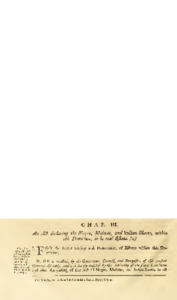Full Transcript
An Act declaring the Negro, Mulatto, and Indian Slave this Dominion, to be real Estate. (a)
This Act was explained and amended a Geo. a. (1727) Cap. 4.
I. FOR the better settling and Preservation of Estates within this Dominion,
II. BE it enacted, by the Governour, Council, and Burgesses, of this present General Assembly, and it is hereby enacted by the Authority of the same, that from and after the passing of this Act all Negro, Mulatto, and Indian Slaves, in all Courts of Judicature, and other Places, within this Dominion, shall be held, taken, and adjudged, to be real Estate, and not Chattels, and shall descend unto the Heirs and Widows of Persons departing this Life, according to the Manner and Custom of Land of Inheritance, held in Fee Simple.
III. PROVIDED always, that nothing in this Act contained shall be taken to extend any Merchant or Factor bringing any Slaves into this Dominion, or having any Consignments thereof unto them, for Sale; but that such Slaves, whilst they remain unsold in the Possession of such Merchant or Factor, or of their Executors, Administrators, or Assigns, shall to all Intents and Purposes, be taken, held, and adjudged, to be personal Estate, in the same Condition they should have been in if this Act had never been made.
IV. PROVIDED also, that all such Slaves shall be liable to the Payment of Debts, and may be taken by Execution, for that End, as other Chattels or personal Estate may be. (a)
V. PROVIDED also, that no such Slaves shall be liable to be escheated by Reason of the Decease of the Proprietor of the same, without lawful Heirs; but all such Slaves shall, in that Case, be accounted and go as Chattels, and other Estate personal.
VI. PROVIDED also, that no Person selling or alienating any such Slave shall be obliged to cause such Sale or Alienation to be recorded, as is required by Law to be done upon the Alienation of other real Estate; but that the said Sale, or Alienation, (b) may be made in the same Manner as might have been done before the making of this Act.
VII. PROVIDED also, that this Act, or any Thing therein contained, shall not extend, nor be construed to extend, to give any Person, being Owner of any Slave or Slaves, and not seized of other real Estate, the Right or Privilege as a Freeholder, meant, mentioned, and intended, by one Act of this present Session of Assembly, intituled An Act for regulating the Elections of Burgesses, for settling their Privileges, and for ascertaining their Allowances.
VIII. PROVIDED also, that it shall and may be lawful for any Person to sue for and recover any Slave, or Damage for the Detainer, Trover, or Conversion thereof, by Action personal, as might have been done if this Act had never been made.
IX. PROVIDED always, that where the Nature of the Case shall require it any Writ de partitione facienda, or of Dower, may be sued forth and prosecuted, to recover the Right and Possession of any such Slave or Slaves.
X. PROVIDED, and be it enacted, that when any Person dies intestate, leaving several Children, in that Case all the Slaves of such Person (except the Widow’s Dower, which is to be first set apart) shall be inventoried and appraised, and the Vales thereof shall be equally divided amongst all the said Children, and the several Proportions, according to such Valuation and Appraisement, shall be paid by the Heir to whom the said Slaves shall descend by Virtue of this Act unto all and every the other said Children; and thereupon it shall and may be lawful for the said other Children, and every of them and their Executors or Administrators, as the Case shall be, to commence and prosecute an Action upon the Case, at the common Law, against such Heir, his Heirs, Executors, and Administrators, for the Recovery of the said several Proportions, respectively.
XI. AND be it further enacted, by the Authority aforesaid, that if any Widow, seized of any such Slave or Slaves as aforesaid, as of the Dower of her Husband, shall send, or voluntarily permit to be sent, out of this Colony and Dominion, such Slave or Slaves, or any of their Increase, without the lawful Consent of him or her in Reversion, such Widow shall forfeit all and every such Slave or Slaves, and all other the Dower which she holds of the Endowment of her Husband’s Estate, unto the Person or Persons that shall have the Reversion thereof; any Law, Custom, or Usage, to the contrary notwithstanding. And if any Widow, seized as aforesaid, shall be married to a Husband who shall send, or voluntarily permit to be sent out of this Colony and Dominion, any such Slave or Slaves, or any of their Increase, without the Consent of him or her in Reversion, in such Case it shall be lawful for him or her in Reversion to enter into, possession and enjoy, all the Estate which such Husband holdeth in Right of his Wife’s Dower, for and during the Life of the said Husband.
(a) See 22 Geo. 2. (1748) Cap. 6. Sect. 10 and Cap. 8. Sect. 16.
(b) See 30 Geo. 2. (1757) Cap. 3. And 32 Geo. 2. (1758) Cap. 1. to prevent fraudulent Gifts of Slaves.
(a) See 22. Geo. II. (1748) Cap. 17. Sect. I. against clandestine Transportation of Slaves, and 27. Geo. II (1753) Cap. [?] Sect. 28. Felony to steal Slaves.
Date
Location
Citation
Download Original
Images published from the Internet Archive are provided at no cost and granted for scholarship and research purposes. Further information is available from the Internet Archive’s Terms of Use, Privacy and Copyright Policy.
